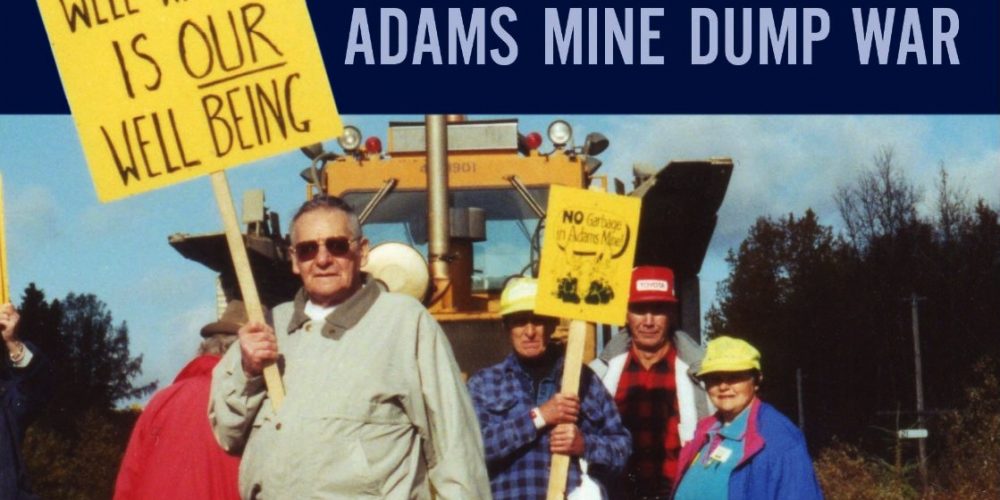Charlie Angus, NDP MP for the northern Ontario riding of Timmins-James Bay, has been singled out by numerous political commentators as one of Canada’s most effective parliamentarians and influential citizens. His latest book shows why. Unlikely Radicals: The Story of the Adams Mine Dump War is about the success of a grueling 20-year community organizing campaign against formidable opponents in Ontario under the City of Toronto’s scheme to use the abandoned open-pit Adams Mine as a garbage dump.
Charlie Angus, NDP MP for the northern Ontario riding of Timmins-James Bay, has been singled out by numerous political commentators as one of Canada’s most effective parliamentarians and influential citizens. His latest book shows why. Unlikely Radicals: The Story of the Adams Mine Dump War is about the success of a grueling 20-year community organizing campaign against formidable opponents in Ontario under the City of Toronto’s scheme to use the abandoned open-pit Adams Mine as a garbage dump.
Angus has been a community activist, operated a homeless shelter, played in the punk rock band L’Etranger and the Juno-nominated Grievous Angels, launched the northern Ontario magazine HighGrader, worked as a social-justice advocate within the Catholic Church, taken a passionate interest in the welfare of First Nations children, been a community organizer, and is a persistent and principled defender of democracy.
Unlikely Radicals provides detailed documentation of “how a dump fight morphed into a two-decade campaign of creative and determined civil resistance.” Angus believes that “the real success of the campaign was the effort to build bridges between groups that had previously been divided. And thus we came together – First Nations people and farmers, environmentalists and miners, urban and rural folks, anglophones and francophones. In the crucible of a dump war, community was built and community won out. For me, the lessons learned in this fight have served as a roadmap for my life in federal politics.”
The story tracks the remarkable events and developments of a brilliantly orchestrated regional uprising against the most entrenched economic and political power elites of Ontario. The documentation is at times overwhelming in its detail, but this is necessary to fill out the narrative of an extraordinarily complex struggle. The book provides powerful proof that principled action can be guided by basic rules: “the democratic rights of citizens must be rooted in access to fair public process backed up by an uncompromised public service.”
After the 200 meter deep Adams Mine closed in 1990, its fractured walls allowed water to fill the cavity to 100 meters. Meanwhile, burgeoning Toronto was mired in a fruitless process to find a solution to its garbage problem. Local townships in the south resisted attempts by the Conservative government to find a nearby site. The new NDP government headed by Bob Rae passed legislation requiring waste to be treated close to source, but the far right-wing Mike Harris government elected in 1995 was sympathetic to moving garbage by truck or train to a distant, “willing host” municipality.
Thus came the proposal led by powerful private interests with well-groomed political connections to turn the Adams mine into a giant dump which would receive over three million tonnes of Toronto garbage each year. Although the dump was to operate for only 20 years, water would have to be pumped out for 1000 years to prevent leachate from seeping into area groundwater.
The fight was on. Through rallies, marches, road blockades, community events, letter writing sessions that delivered over 60,000 letters to the diminished staff of the newly-weakened Ministry of the Environment, and eventually civil disobedience, a broad coalition of interests solidified and pressed the issue closer and closer to its corporate sponsors, the politicians in the City of Toronto, and the provincial legislature.
Their opposition was wily, wealthy, and well-connected, but the community forces always managed to reorganize and redirect fresh tactics. The northerners knew the importance of verifying their suspicions, and even fruitfully employed a private detective to get photos of Premier Harris meeting with the supposedly independent proponents of the dump. They also tracked the sizeable political donations flowing from corporate bosses to influence politicians.
There were unexpected breakthroughs. A supporter of the campaign, dining at Churchill’s Prime Rib House in North Bay, discovered that the guests at the next table were strategists of the proponents scheming to buy off northern communities. They delivered statements such as “we hope the pit doesn’t leak, but if it does, f-k it!” to the attentive ears at the next table.
Angus discusses numerous lessons from the fight and draws our attention to similar trends to defile democracy by the current federal government under Prime Minister Harper. Above all, he decries the “cynical gutting of objective standards for accountability” and that people like Harris and Harper “believe that people can be diverted from the bigger issues by the politics of fear and resentment.”
Angus concludes by reminding us, “we all have a stake in ensuring that legitimate public process is protected. There is a fundamental obligation to ensure that the interests of the powerful are not given free rein.” And, most importantly, “that ordinary people have the capacity to accomplish extraordinary things for the common good.”
Unlikely Radicals: The Story of the Adams Mine Dump War, Charlie Angus, Toronto: Between the Lines, 2013, 228 pages
Reviewer Information
Greg Michalenko is a member of Alternatives Journal’s editorial board.













